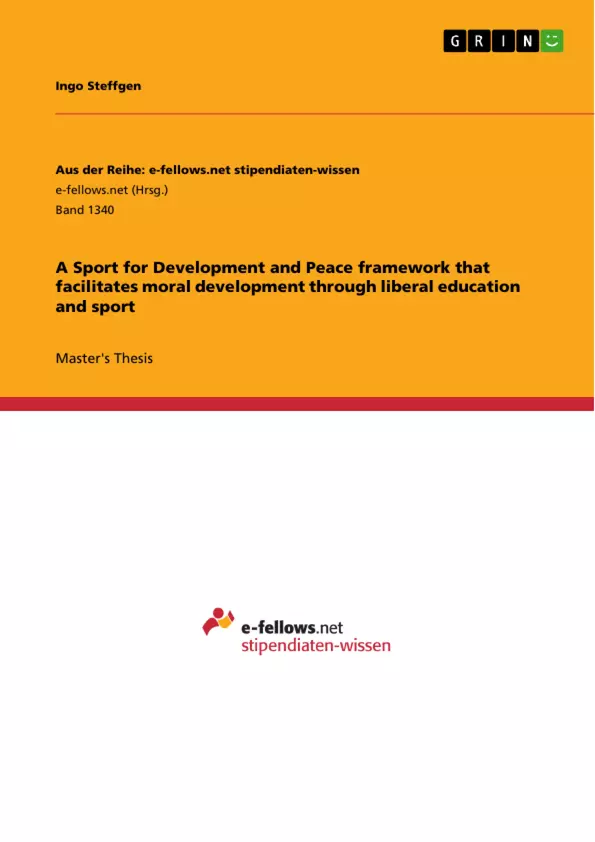The Western world commonly champions the power of sport for social cohesion and com-munal pride (Schulenkorf, 2011) through sporting mega events and small-scale development projects. Empirical evidence, however, that proof those claims are scarce (Chalip, 2006; Coalter, 2007; Kidd, 2008). Sport for good has received critics based on statistical proof that neither economical nor other social benefits reach the ones in need (Briedenhann, 2011). Even further most projects claiming to assist the United Nations Millennium Development Goals (http://www.un.org/millenniumgoals/) are poorly implemented and lack coordination with mainstream development activities (Tiessen, 2011). The complexity of conflicts and difficulty to transform those to achieve sustainable peace makes it impossible for sport as a single phenomenon to be detached from broader initiatives. Consequently, the document hereafter aims to combine theory and anecdotal evidence to suggest a Sport for Development and Peace framework (SDP) that is believed to be universal and leaves positive legacies be-hind. The suggested methodology utilizes the ideas of liberal education and the perks of sport to facilitate moral development.
Inhaltsverzeichnis (Table of Contents)
- Introduction
- A roadmap to initiation, integration and innovation of SDP.
- Thesis rationale, assumptions, and theoretical foundation.
- Practicality of theoretical content.
- Initiation - Moral development and its worth.
- The theory of Ethics
- Aiming for perpetual peace according to Kant.
- A moral identity that reaches beyond.
- Creating a safe haven for moral development.
- Moral development as a form of conflict transformation.
- Creativity a core principle for conflict resolution.
- Moral education a means to transform conflicts.
- Moral development in business.
- Final remarks
- Integration - Sport as vehicle for moral education.
- A critical reflection of current SDP practices
- Scope and status of SDP today.
- The paradoxical nature of SDP.
- International Sport Federations and their approach to development work.
- Common objectives of contemporary SDP practices.
Zielsetzung und Themenschwerpunkte (Objectives and Key Themes)
This document aims to develop a comprehensive framework for Sport for Development and Peace (SDP) that promotes moral development through liberal education and sport. This framework seeks to be universally applicable, culturally and socially unbiased, and capable of leaving positive legacies behind.
- Moral Development as a Foundation for Sustainable Peace
- Critical Evaluation of Current SDP Practices
- The Role of Liberal Education in Fostering Moral Development
- The Importance of Mutual Agreement and a Social Contract in Sport
- The Transformative Power of Sport as a Vehicle for Moral Education
Zusammenfassung der Kapitel (Chapter Summaries)
The document is structured in three parts. The first part establishes a universal foundation for moral development, exploring ethical theory and arguing for the importance of ethical training. The second part critically examines current SDP practices, highlighting their limitations and the need for a more holistic approach. The third part focuses on the integration of sport and liberal education to facilitate moral development, emphasizing the need for a mutual agreement to a code of conduct and a shared pursuit of excellence.
Schlüsselwörter (Keywords)
This document focuses on the key concepts of Sport for Development and Peace (SDP), moral development, liberal education, mutual quest for excellence, and conflict transformation. It examines the challenges and opportunities of using sport as a tool for social good, advocating for a framework that integrates ethical principles and promotes positive social change.
Frequently Asked Questions
What is the Sport for Development and Peace (SDP) framework?
SDP is a methodology that uses sport as a tool to achieve broader social goals, such as social cohesion, moral development, and sustainable peace in conflict-affected areas.
How can sport contribute to moral development?
By integrating liberal education principles, sport can teach ethics, mutual respect, and adherence to a shared code of conduct, which are essential for character building.
What are the common criticisms of current SDP projects?
Critics argue that many projects lack statistical proof of success, are poorly implemented, and often fail to coordinate with mainstream development activities.
How does Kant's theory of ethics apply to SDP?
The framework draws on Kantian ideas of perpetual peace and moral duty to suggest that ethical training through sport can lead to a more stable and peaceful society.
What is "conflict transformation" in the context of sport?
It involves using sport to change the dynamics of a conflict by providing a safe haven for interaction, fostering creativity, and teaching peaceful resolution strategies.
Why is a "mutual quest for excellence" important?
It shifts the focus from winning at all costs to a shared pursuit of high standards, encouraging participants to respect their opponents and the rules of the game.
- Citar trabajo
- Ingo Steffgen (Autor), 2013, A Sport for Development and Peace framework that facilitates moral development through liberal education and sport, Múnich, GRIN Verlag, https://www.grin.com/document/300891



